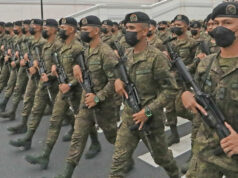ASEAN chief justices to share knowledge on judgements, court processes
THE chief justices of the 10-member Association of SouthEast Asian Nations (ASEAN) have committed to further strengthen knowledge-sharing on court processes, enforcement of judgements in both civil and commercial cases, and handling disputes of international interest.
The Council of ASEAN Chief Justices (CACJ) on Thursday signed the Hanoi Declaration, an agreement on judicial cooperation through the conduct of a masterclass for ASEAN judges and judicial officers on Hague conventions concerning the taking of evidence abroad in civil or commercial matters, and the recognition and enforcement of foreign judgements in civil or commercial matters.
Under the declaration, the chief justices also agreed to create a working group to study the current legal framework within each ASEAN jurisdiction governing the taking of evidence for foreign proceedings and develop a model rule.
The signatories were Chief Justice Diosdado M. Peralta of the Philippines, Chief Justice Steven Chong Wan Oon of Brunei Darussalam, Vice President You Ottara as representative of the President of the Supreme Court of Kingdom of Cambodia, Chief Justice Muhammad Syarifuddin of Indonesia, Vice President Bounkhouang Thavisack as representative of the President of the People’s Supreme Court of the Lao People’s Democratic Republic, Chief Justice Tun Tengku Maimun binti Tuan Mat of Malaysia, Chief Justice Htun Htun Oo of Myanmar, Judge Lee Seiu Kin as representative of the Chief Justice of the Supreme Court of Singapore, Metinee Chalodhorn as President of the Supreme Court of Thailand, and Chief Justice Nguyen Hoa Binh of Vietnam.
In a statement on Friday, the Supreme Court Public Information Office said the declaration complements the high court’s approval of the guidelines on the implementation of the Hague Service Convention on the Service Abroad of Judicial Documents in Civil and Commercial Matters, which is expected to address court delays and simplify the serving of summons and other documents in a foreign jurisdiction.
“The Guidelines shall govern the operation and implementation of the Hague Service Convention in the country, insofar as they concern judicial documents in civil or commercial matters,” the information office said.
The CACJ acknowledged that the “the Working Group on Cross-Border Disputes Involving Children has (a) began to explore the possibility of developing a common set of values, aspirations and principles for ASEAN Judiciaries in cases of cross-border child disputes within ASEAN; and (b) agreed to explore holding the 3rd ASEAN Family Judges Forum in conjunction with the 2022 HCCH Judicial Roundtable on the 1980 Hague Convention on the Civil Aspects of International Child Abduction and the 1996 Hague Convention on Parental Responsibility and Protection of Children.” During the gathering hosted by the Judiciary of Vietnam, Mr. Peralta shared the Philippine Judiciary’s reduction of bail and granting recognizance for indigent persons deprived of liberty, which addresses the need to further decongest overcrowded jails and detention facilities to further prevent the spread of the lethal coronavirus.
Mr. Peralta also shared that the local judiciary already allowed the online filing of complaints or criminal information as well as posting of bail, and started the pilot testing of hearings of criminal cases through video conferencing.
The 9th CACJ meeting will be hosted next year by the Judiciary of Indonesia. — Kyle Aristophere T. Atienza



